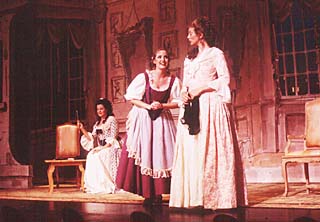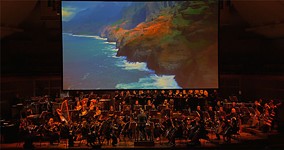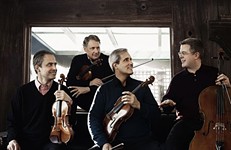Cosi Fan Tutte: Doin' What Comes Naturally
Local Arts Reviews
Reviewed by Robi Polgar, Fri., Oct. 29, 1999

Cosi Fan Tutte: Doin' What Comes Naturally
McCullough Theatre,
through October 31
Running Time: 2 hrs, 45 min
There is something about sexual shenanigans and Mozart. Don't take love too seriously, he seems to be saying with his buoyant music and his characters' whimsical stage antics. Wait until November for the darker side of humanity's preoccupation with love's chase in Austin Lyric Opera's staging of the Mozart masterpiece Don Giovanni; this is the season for wooing, and the students of UT Opera Theatre woo, coo, and fool with chipper abandon, and great good fun.
This delightful, engaging production makes the absolute most of its simple, comic plot, while offering the audience the very best of the mature Mozart's witty, melodic score. Actually, these performers are less student and more pre-professional, if you will, with many claiming credits from around the world when they are not learning their craft at the university.
In this opera, the title of which translates roughly as "they all do it," old Don Alfonso bets his two young pals Ferrando and Guglielmo that their loves Dorabella and Fiordiligi would just as soon fall for any other guys if the opportunity presented itself. The young men agree to put their loves to the test, thinking that it will be an easy 100 zecchini (no mean sum!). So, Don Alfonso, enlisting the aid of the very down-to-earth young maidservant Despina, contrives to break the ladies' affections for their men. The ploy is to pretend to send the two lads off with their regiment to "the front," then have them masquerade as two wealthy, love-lorn Albanians to lay siege to the ladies' hearts. Rebuffed repeatedly, Ferrando and Guglielmo seem to be winning the bet, but slowly, the girls' affections shift toward Albanian amour, then the two young lovers must enlist Don Alfonso's aid in seeing that all is made well again, which, naturally, it is.
"Naturally" best describes the ensemble's comfort and craft -- both acting and singing -- throughout the opera. Edward White makes a zesty old know-it-all of Don Alfonso, his bass a combination of amusement and cynicism: the production's undercurrent. Soprano Georgia Pickett provides a dash of piety to her slipping steadfastness as Fiordiligi. The other four cast members share roles on alternate nights. Friday night's quartet included Arikka Gregory and Andrew Coward as Dorabella and Ferrando -- good singers both, though their acting sometimes outshone their singing. Kerry French made Despina a boisterous, fun-loving, and able sidekick to Don Alfonso, again equally adept acting or singing. And Keith Gipson possesses a remarkable and strong baritone as the cocksure Guglielmo. Hak-Min Kim's direction takes advantage of the cast's ability to move, creating dandy little bits of business that never impede the musical storytelling. You know the cast is comfortable when unexpected bumps get transformed into charming little character moments: Don Alfonso, hovering near a birdcage in the ladies' drawing room, accidentally knocked the prop parakeet from its perch. With a slightly chagrined look, he smoothed the cage, made sure the other characters were unaware of the bird's demise, and lightly stepped in front of the cage: Problem solved!
The student orchestra tackles Mozart's score surely and effervescently, in spite of the delays that preceded both acts: Would conductor Kurt Klippstatter ever make it to the pit? The set, designed by the late John Rothgeb, creates a bright, cartoon-like world for these happy-go-lucky characters with painted drops of various settings, indoors and out. It fashions depth where there is none, a fitting commentary to the play's moral: Don't look for depth where there is none; live and love, and happiness will surely follow.










